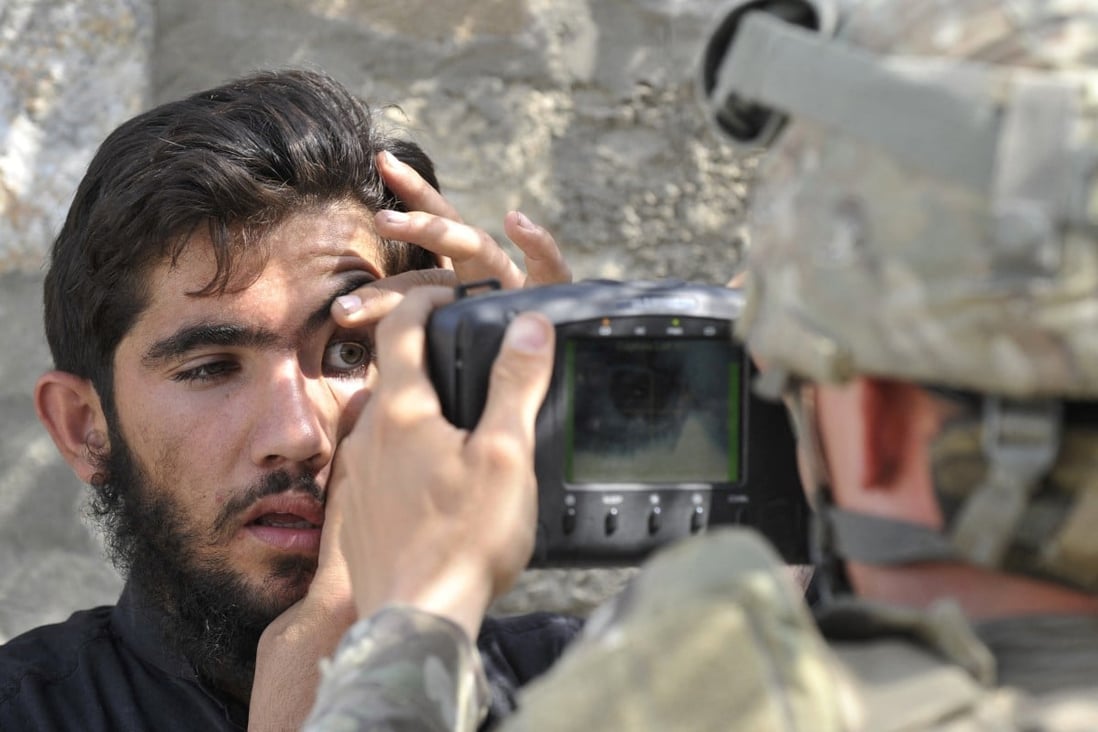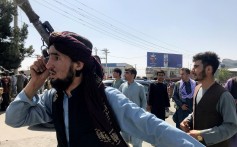Kissinger, quoted long ago, might turn out to be too spot-on, for the betrayal is total and absolute
wsj.com
Henry Kissinger once quipped that "it may be dangerous to be America's enemy, but to be America's friend is fatal."
scmp.com
Afghanistan: Taliban seized US military biometric devices, report says
Afghans scramble to delete digital history, evade biometricsConcerns that digital IDs and databases can be used to target people
Agencies
Published: 2:36pm, 19 Aug, 2021
 
A US soldier scans the eyes of an Afghan man with an Automated Biometric Identification System in 2011. File photo: AFP
Taliban forces have reportedly seized US military biometric devices that can scan irises, fingers, and faces, which could help them identify Afghans who assisted coalition forces.
The devices, known as HIIDE, or Handheld Interagency Identity Detection Equipment, were seized during the Taliban’s offensive, according to The Intercept.
The Intercept spoke to current and former US military officials, “all of whom worried that sensitive data they contain could be used by the Taliban”.
The devices are mean to connect with Biometrics Automated Toolset (BAT), identification-processing software used by US soldiers to scan for threats.
HIIDE can create tracking reports of biometric encounters and warns users if a person being checked is on a watch list, Signal Magazine reported.
If the Taliban have not already accessed the data, a US Army Special Operations veteran said that the Inter-Services Intelligence (ISS), Pakistan's spy agency that has a history of working closely with the Taliban, may provide them with the tools to do so, The Intercept reported.
Many Afghans who were not evacuated were racing to erase their past online activity.

Boys and men were “frantically going through phones to delete messages they have sent, music they’ve listened to & pictures they’ve taken,” BBC reporter Sana Safi wrote on Twitter on Sunday.
UN Secretary-General Antonio Guterres has warned of “chilling” curbs on human rights and violations against women and girls, and Amnesty International on Monday said thousands of Afghans – including academics, journalists and activists – were “at serious risk of Taliban reprisals”.
Although one anonymous woman who worked for the Afghan government burned every document tying her to her former employment, she still worries that biometric data she gave when she was hired will be used by the Taliban to track her down, The Wall Street Journal reported.
“We understand that the Taliban is now likely to have access to various biometric databases and equipment in Afghanistan,” the Human Rights First group wrote on Twitter on Monday.
“This technology is likely to include access to a database with fingerprints and iris scans, and include facial recognition technology,” the group added.
The US-based advocacy group quickly published a Farsi-language version of its guide on how to delete digital history – that it had produced last year for activists in Hong Kong – and also put together a manual on how to evade biometrics.
Tips to bypass facial recognition include looking down, wearing things to obscure facial features, or applying many layers of make-up, the guide said, although fingerprint and iris scans were difficult to bypass.
“With the data, it is much more difficult to hide, obfuscate your and your family’s identities, and the data can also be used to flesh out your contacts and network,” said Welton Chang, chief technology officer at Human Rights First.
US troops unable to help people get to Kabul airport, says Pentagon chief
19 Aug 2021

Even five years ago, the Taliban was using government biometric systems to target members of the security forces, checking their fingerprints against a database, according to local media reports.
On Monday, just hours after the militants rolled into the capital Kabul, there were fears that this was already happening.
“Taliban started door-to-door search” for government officials, former security forces members and those who worked for foreign non-profits, a Twitter user called Mustafa said, adding that journalists’ homes were also searched.
A Kabul resident said in a private message that she had heard of house-to-house inspections, and that the Islamist militants were using a “biometrics machine”.
The Taliban, in a statement, said it “assures all its citizens that it will, as always, protect their life, property and honour and create a peaceful and secure environment for its beloved nation”.
Thomson Reuters Foundation and Business Insider |







